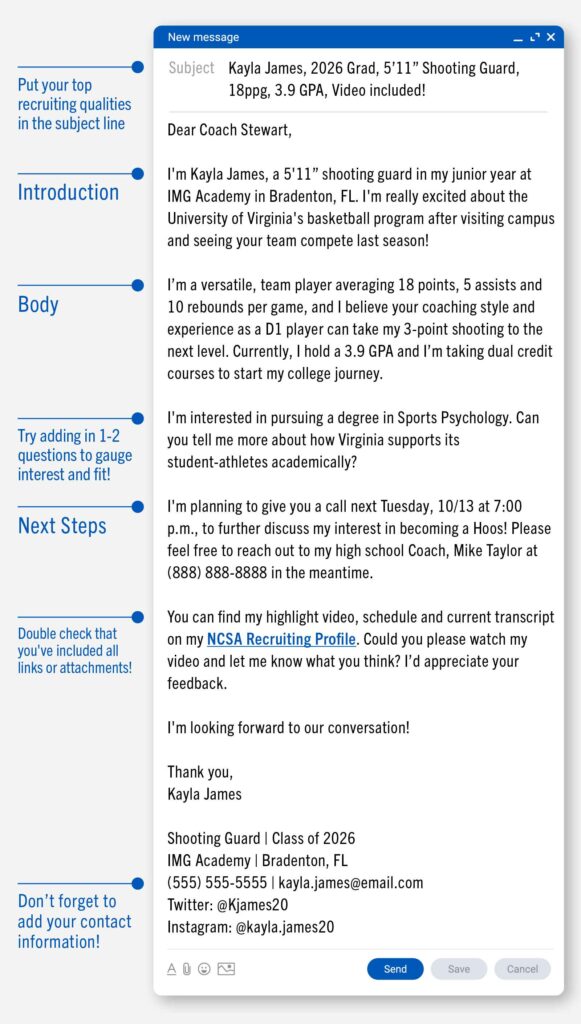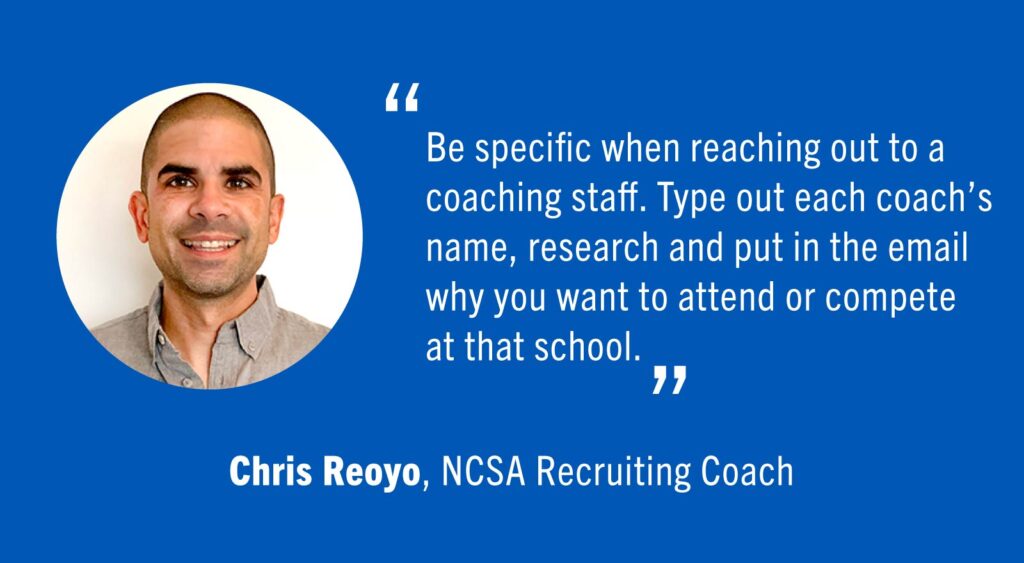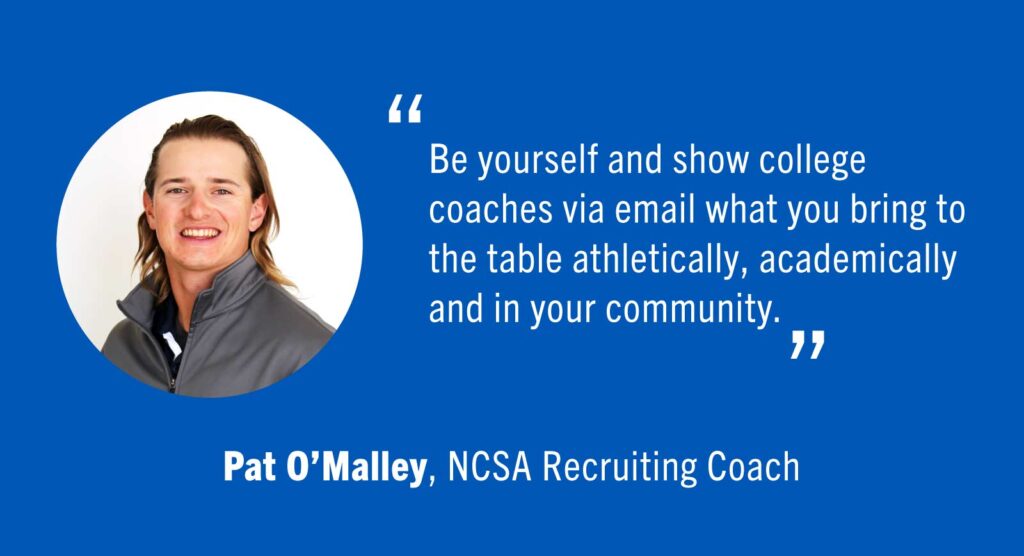

One of the most asked questions we get is how to email a college coach. Sending an introductory email to a college coach can get your foot in the door with a program you’re interested in. But here’s the thing: coaches receive a ton of emails from recruits – sometimes hundreds or even thousands. So, just sending an email isn’t enough to get noticed.
To improve your chances of the coach opening and replying to your email, you’ll need to write a clear, personalized email with a subject line that catches their eye. We’ve gathered some useful resources, including examples and templates, to show you how.
Here’s a quick rundown on how to write an email to a college coach:

Insider Tip:
Make things easy for college coaches by including your NCSA Profile link in your email. It gives them quick access to all your recruiting details. No profile yet? No sweat. Create a profile today and make your recruiting emails stand out!
It’s tempting to copy and paste when reaching out to multiple schools, but this decreases your chances of being noticed. To stand out, you need to personalize each email for the coach you’re contacting.
Our introductory email template below can help you get started but remember that each email should be adjusted to fit that particular school. Use your judgment to decide what to include, add or exclude based on what’s relevant to your sport and the school.
Subject Line: [Your Name] [Grad Year] [Position/Event] [1-2 Key Stats/Skills] [Video]
Dear Coach [First/Last Name],
I’m [Your Name], a [Year in School] at [High School] in [City, State], and I’m set to graduate in the class of [Graduation Year]. I [Play/Compete] in [Your Position/Event], and what makes me stand out as a potential recruit for your program is [List 2-3 standout skills/stats].
I’m really excited about your program because [Add 1-2 sentences about the research you did on the school, coach and/or sports program].
Some of my proudest academic and athletic accomplishments are [List 2-3 athletic/academic stats]. I have a [insert GPA and/or SAT/ACT test scores]. In the off season, I’m actively involved in [List extracurricular activities].
You can find my highlight video and recruiting materials on my NCSA profile at [Insert Link]. Can you please check out my video and let me know what you think? Your input on what I should work on to improve my chances of joining your program would be really helpful.
I’ve also attached my upcoming schedule and I’d appreciate it if you could attend one of our games this season. [Add Attachment].
I will be calling you on [Date/Time] to further discuss my interest in [School Name]. I look forward to our conversation!
Please feel free to contact my [High School/Club] coach, [Coach First/Last Name], at [Email and Phone Number] for more information.
[Your Name]
[Graduation Year] [Position/Event]
[NCSA Recruiting Profile Link]
[Phone] [Email]
[Social Media Handle]

Insider Tip:
Need to track down college coach email addresses? NCSA makes it easy to find contact information for coaches and gather your college coach email list across all division levels. Check out our tutorial video on using NCSA Message Center to streamline the process of reaching out to coaches—making it hassle-free!
Your opening paragraph to a college coach, like your subject line, should be attention-grabbing and personalized. After the initial introduction, the first one or two sentences must be distinct for each coach email you send.
Here are some examples on how to start your email to a college coach:
“Dear Coach James,
I wanted to connect with you after speaking with Amber Brown, an athlete on your team. She told me about your coaching style and I believe that, based on your emphasis on work ethic and training, I would be a great fit for your program.”
I’ve been following your program on social media and saw the news about your preseason number 1 ranking in the conference! Also, congratulations on being named on the Coach of the Year watch list. This has me really excited about the possibility of joining your program!”
“Hi Coach Williams,
While exploring your program, I noticed that you have five seniors graduating this year. I’m really excited about the opportunity to help fill the gap they’ll leave. I’m a versatile guard with strong dribbling skills and a sharp 3-point shot.”
Below, you’ll find 6 sample emails from athletes to coaches. These examples will help give athletes a better understanding of the various recruiting topics they need to cover when writing emails to college coaches.

Did you know?
NCSA’s Messaging Center gives you direct access to message college coaches and easily organize all your conversations in one place. Explore this feature and more by upgrading your NCSA membership or signing into your profile. Don’t have a profile? Create one now!
Our data show that it’s best to send an email to college coaches 4-8 p.m., Tuesday-Sunday. But the truth is, there’s no one-size-fits-all answer. Coaches have their own preferences, and it mainly depends on their season or the NCAA recruiting calendar.
Keep these three tips in mind when emailing college coaches:
Insider tip:
Turn your “read receipt” function on in NCSA Message Center to see if a coach has opened your email. This feature is helpful for athletes who are too young to be contacted by a coach yet. Read receipts will let you know if a coach has opened your email, so you can follow up accordingly.
Feeling ready to send an email to a college coach? Great! However, there are some steps to take before you hit send. A well-crafted introductory email can get you noticed, but it’s equally important to be prepared for a coach’s research or response. Here are three pre-email actions:
Throughout this page, we’ve stressed the importance of emails in the college recruiting process, explained what coaches are searching for and given you valuable resources and tools to help you create these messages.
NCSA Basketball Recruiting Coach, Ben Wright, shares his three key takeaways for student-athletes to keep in mind when emailing college coaches: be well-prepared, maintain professionalism and add a personal touch. By following these guidelines, you’ll be on your way to creating emails that truly stand out and make a positive impression on college coaches.
Sending a solid email to a college coach is just the start of your journey. Ready for what’s next? Create your free profile with NCSA today and open the door to exciting opportunities for your future in sports.
NCAA D1 and D2 college coaches can respond to your email on or after June 15 or September 1 of your junior year in high school. The exact date depends on your sport. There are no email restrictions for D3 coaches.
However, this doesn’t stop you from sending an email before then. In fact, we recommend it if you feel confident about competing there. In these cases, college coaches may reach out to a recruit’s high school or club coach to schedule a time for the athlete to call. So, it’s always a good idea to loop in your current coach to see how they can help you get recruited.
Yes! You should email a college coach who follows or views your NCSA profile. It’s a positive sign of their interest in you and a chance to express your interest, share more about yourself and start building a relationship.
You’ll need to do some research on the school to know who to email first. NCAA D1 schools often have recruiting coordinators who handle the initial evaluation of recruits. For other division levels, we recommend starting with the head coach.
Once you’ve made that initial connection, keep the conversation going with the specific coach you’ve been in touch with. This approach ensures you’re reaching out to the right people during the recruiting process.
Be patient. Coaches are busy and it may take them a couple of weeks to respond. If you haven’t heard back in this time frame, think about sending a follow-up email or reach out to your high school or club coach to assist with the introduction. If you’re an underclassman, keep in mind coaches can’t respond to you just yet.
Insider Tip:
Download the NCSA app in the App Store or on Google Play to email coaches, get notifications, get coach contact info, create and manage custom email templates.